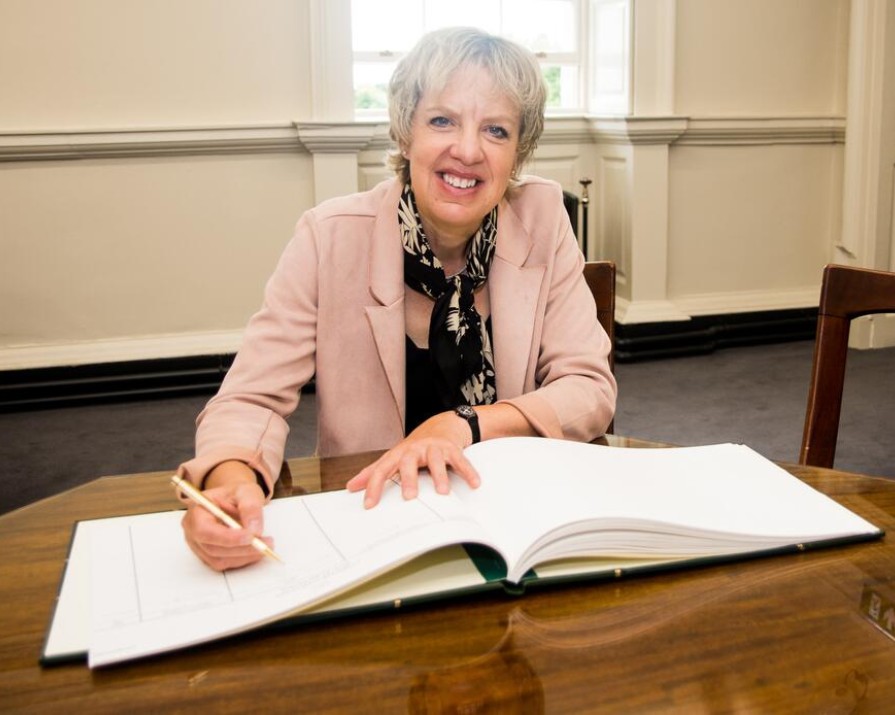
By Dominique McMullan
23rd Jan 2024
23rd Jan 2024
It looks likely that 2024 will see the introduction of paid miscarriage and fertility leave in Ireland. Here, Dominique McMullan sits down with Labour Party Leader Ivana Bacik to discuss why the introduction of this legislation is not just about feeling supported at work, but also about being protected.
As it stands in Ireland today, if a person experiences an early miscarriage (before 24 weeks), they have no entitlements to workplace leave. Your options, if you are working full time and need to take time off, are 1) to tell the truth and hope for an empathic boss 2) to lie and feign another illness, or 3) to take annual leave.
Having to take any of these actions after experiencing such a potentially devastating health event feels nothing short of archaic in a modern Ireland. The current lack of legislation is damaging, and is reminiscent of a nation in which women’s health is not respected nor prioritised.
Approximately 14,000 women a year experience early miscarriage in Ireland, up to one in four pregnant women. I was one of them and I understand first-hand the devastating impact, both physically and mentally, the experience can have. I also understand how valuable it was to be able to be honest with my employer at the time.
Advertisement
Paid leave
This year, the Labour Party will be pushing government to implement legislation providing up to 20 days’ paid leave for women who experience early miscarriage and up to 10 days’ paid leave for any employee who needs time off work to avail of IVF or other reproductive-health related treatment.
The Bill for this legislation was passed in the Seanad on December 29th 2023 with government support. It was the only piece of opposition legislation to do so last year, highlighting how compelling and important this Bill truly is – no matter your politics.
This was the last Bill Labour Party Leader Ivana Bacik introduced to the Seanad in May 2021 before she was introduced to the Dail. Now, it’s time for the final push to ensure these urgent changes are implemented.
“We have seen an outpouring of support from women and indeed couples who have experienced early pregnancy loss, and who are struggling with fertility.” Ivana tells me over Zoom. “Even in the Seanad debates, senators spoke very movingly about their own experiences.”
“There’s a huge, unspoken tsunami of grief out there,” she goes on. “Early pregnancy loss touches so many families, and yet there is still a silence and stigma around it. I think women in particular, are getting better at talking to their friends and families when experiencing fertility issues, but the introduction of this legislation would enable them to feel supported in the workplace —that’s where the real silence is.”
Breaking the silence
This legislation would go a long way in helping to normalise discussions around pregnancy and fertility in the workplace. It would enable a structure within which to have potentially difficult conversations and further an understanding that a huge Irish workforce may menstruate, have babies, lose babies, struggle to have babies, etc. It would move us closer towards a recognition that these experiences do not exist within a vacuum, outside of the workplace.
Advertisement
“Along with the introduction of legislation,” Ivana explains, “I would like to see an ‘End The Silence’ campaign encouraging people to speak up about their early pregnancy experiences, and about their fertility experiences, to help anyone in that situation feel less alone and feel more supported.”
The introduction of this legislation is not just about feeling supported at work. It’s also about being protected. We’re all more than aware of the discrimination women can face when they’re of childbearing age, so it’s no surprise that some are wary of disclosing such personal information. Without laws to protect their rights, women in these situations can be left feeling exposed. The introduction of this legislation would offer support when they need it most.
Female leaders
One of the catalysts Ivana points to regarding to the initial creation of the Bill, is Jacinda Arden’s implementation of paid miscarriage and fertility treatment leave when she was prime minister of New Zealand in 2021.
As a female leader, I asked Ivana if women are what is needed in order to highlight issues like this at government level. “We’ve seen women really to the fore in prompting this sort of legislation, I had the privilege in meeting Jacinda Ardren recently, she is an incredible role model for women in politics. I told her just how much we admired the way she had driven change for women. We need more women in the Oireachtas, not least because there is a focus on particular issues that are of real relevance to women like early pregnancy loss, like abortion rights, like FGM.”
So will the changes happen this year? “It could be law in a matter of months,” says Ivana. “Minister O’Gorman has commissioned a study from UCC on early pregnancy loss, which will feed into the debate first. The government has made positive sounds, but we are conscious that there is only a year left of this government in order to get it through. We would like to see the Bill become law before the end of the year.”
Are there any other policy changes in regards to women’s health that Ivana Baick is planning?
Advertisement
“Discussion around the Bill has also facilitated other debates around women’s health issues such as endometriosis and menopause, which are hugely important issues.
“We want to ensure the focus remains on women’s health issues, especially those that are not spoken about. We welcome the state funding for IVF, we want to see free contraception extended, and we want to see more rollout of the free sanitary products scheme. Period poverty is a very real thing.”























